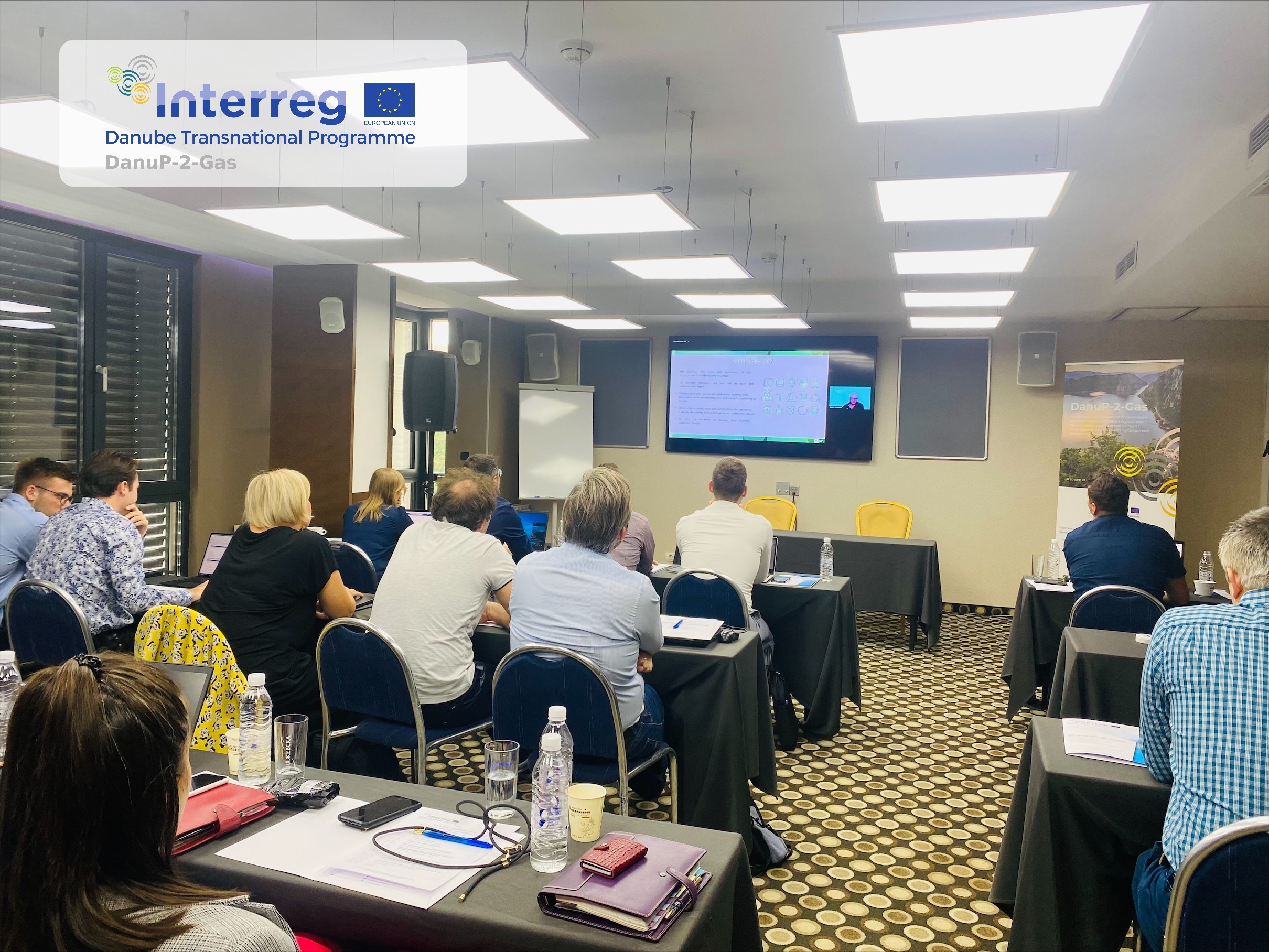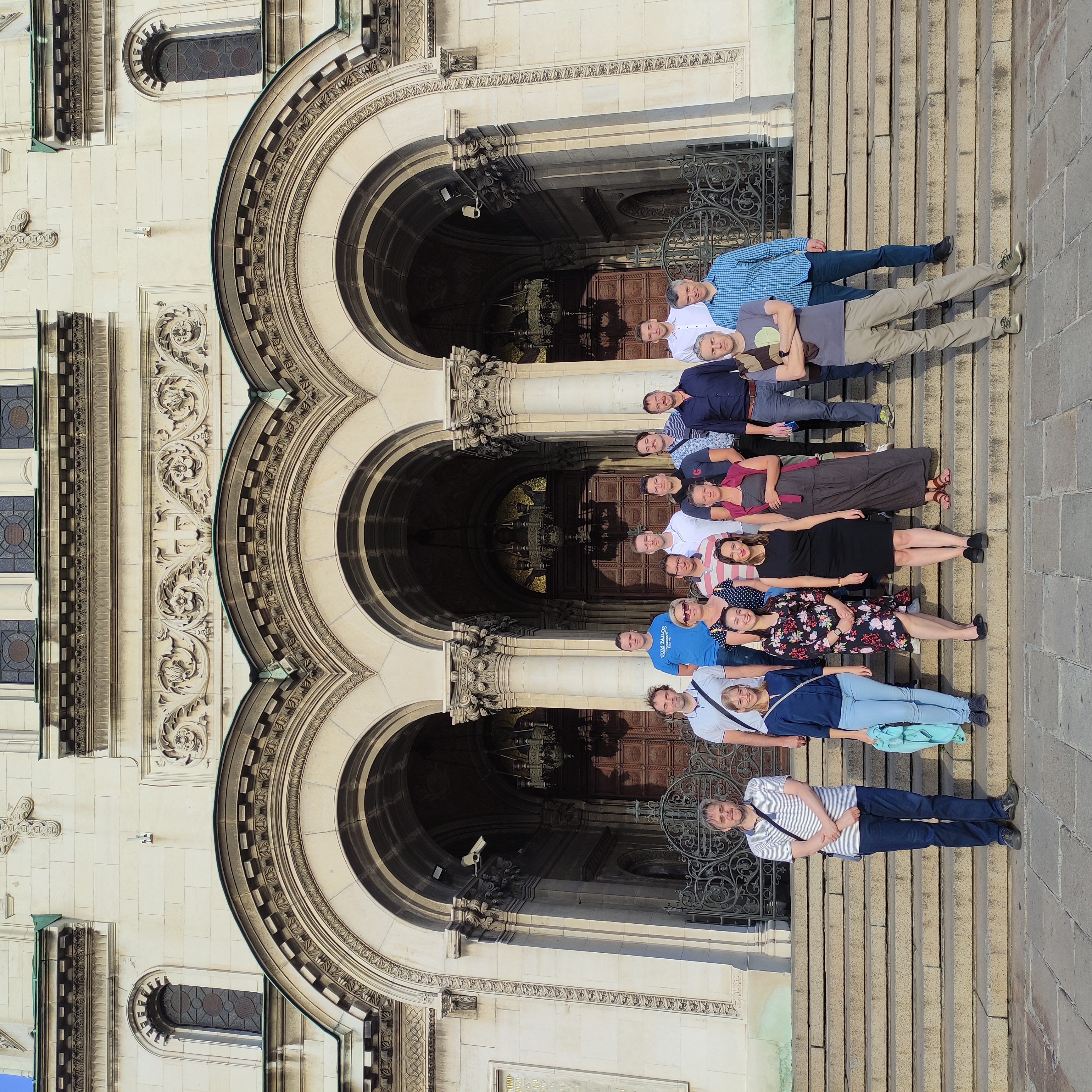DanuP-2-Gas - PARTNER MEETING AND STAKEHOLDER EVENT - SOFIA, BULGARIA
29-08-2022
On 13th and 14th, July 2022, DanuP-2-Gas project stakeholders and representatives of partner organisations managed to meet in person once again, after almost a year of participating in online meetings and conferences. The two-day hybrid event was hosted by the Black Sea Energy Research Centre (BSERC) in Sofia, Bulgaria.
The first day of the event was dedicated to the Stakeholder event, available for public access either in person on-site or online via ZOOM. The focus of the event was on the topics of innovative technologies and supporting infrastructure in the field of renewable energy - green hydrogen, renewable gas, biomass, waste recovery, etc.

Speakers at the event were external project stakeholders and representatives of key target groups, who come from energy service companies, NGOs, gas companies, energy centres, and others from Bulgaria and EU.
List of speakers and their presentations:
- DanuP-2-Gas Project presentation, Astrid Heindel, TZE | Germany
Astrid Heindel is project manager at the Energy Technology Centre of Landshut University of Applied Sciences and part of the managing team of the DanuP-2-Gas project.
- The Danish Biogas and Biomethane Development, Bruno Nielsen, Biogas Denmark | Denmark
Mr. Bruno Nielsen is Biologist. Has been working for more than 25 years in the Danish Biogas Association – actually since its establishment. For the first 20 years as head of the secretariat – and the only person to lobby for biogas production and use in Denmark. From 2014 also secretary for the Association of Danish Biogas Plants. The two organizations were merged in 2017 and coupled with the expansion in the Danish biogas sector. Mr. Nielsen currently holds the position as Chief Operating Officer.
- Veolia’s experience in biogas production and utilization – Wastewater treatment plant in Kubratovo, Stanislav Stanev, Veolia Bulgaria | Bulgaria
Mr. Stanislav Stanev - Regional Director "Technical Activities and Efficiency" in Veolia for Bulgaria and Deputy Executive Director of "Sofiyska Voda", part of Veolia. He is an MBA graduate from the University of Yokohama, Japan. Mr. Stanev has 16 years of experience in the development and implementation of projects aiming to increase the efficiency in the water supply sector and more specifically in the Metropolitan Water Company, where he started his career in 2006 as a Project Manager. Over the years, Mr. Stanev has successively managed several internal operational departments related to increasing the efficiency and quality of the water supply, sewerage, wastewater treatment and resource recovery services.
- Increase the Share of Renewable Energy in the Industrial and Logistic Park Burgas, Stanislav Andreev, EnEffect | Bulgaria
Stanislav Andreev – Manager of EnEffect Consult ЕнЕфект / EnEffect, Center for Energy Efficiency. Graduated from the Technical University of Sofia, subject field “Thermal and Nuclear Power Engineering”. Worked for more than 7 years in the field of energy production and energy efficiency, where he has gained experience in identification of projects, development of energy audits and business plans, and implementation of energy saving measures. Developed more than 35 business plans and over 20 energy audits for assessment of energy efficiency projects. Has extensive experience in assessment of the potential for capture and utilization of landfill gas from municipal solid waste landfills.
- Electrified Steam Reforming of Biogas, Adrian Riendl, Bayerngas GmbH | Germany
Mr. Adrian Riendl, who is Head of Origination at Bayerngas Energy which covers trading flexible products, procuring storage capacity and currently exploring new business opportunities, especially in the field of hydrogen.
- End Uses of Hydrogen with focus on its utilization as a feedstock, Dinko Durdevic, Hydrogen Europe | Belgium
Dinko Durdevic is an analyst within Hydrogen Europe, working specifically on mobility applications. With his previous experience in the energy sector, working on renewable energy sources, he gained an important insight on utilization of hydrogen, but also its products and by-products.
The Stakeholder event was well organized, resulting in new knowledge exchange as well as in the creation of synergies with stakeholders. The next time partners meet with stakeholders will be at the Final event, planned for November in Budapest, Hungary.
On day two of the event, DanuP-2-Gas partners met for the project partner meeting. The meeting focused on the ongoing status of activities as well as on the upcoming tasks in the upcoming, final project period. The meeting was closed to the public.

To find out more about future project events subscribe to the Danup-2-Gas newsletter and follow us on project social media accounts (Facebook, Twitter).
![]()
BACKGROUND
Despite having immense potential for utilization of renewable energy, the Danube region remains critically dependant on energy imports. Based on the current trends related to investment in sustainable energy as well as energy efficiency, the progress of the transition will not be sufficient to meet ambitious climate targets set forth by the international community. Moreover, there are significant technical and economic challenges related to maintaining resilient supply of energy at a growing share of intermittent generation sources, that go even beyond the potential increase of energy poverty especially in economically less developed areas of the region. In this context, effective sector coupling, and circular carbon management offer a feasible approach through which these challenges can be effectively addressed throughout the energy supply chain. Making use of existing opportunities related to low-carbon technologies and utilization of existing infrastructure for storage, the Danube region is able to simultaneously progress its development of critical areas, ranging from energy supply, environment protection to research and development, knowledge transfer and skill development as well as other important socioeconomic factors signifying an increased quality of life. Nevertheless, doing so will require a coordinated multi-disciplinary action of relevant stakeholders approaching the challenges on a transnational level.
ABOUT THE PROJECT
DanuP-2-Gas (Innovative model to drive energy security and diversity in the Danube Region via combination of bioenergy with surplus renewable energy) is meant to advance transnational energy planning by promoting generation and storage strategies for renewables in the Danube Region by coupling the electric power, biomass and gas sectors. It brings together key stakeholders from 12 countries from the region and is co-financed under the Interreg Danube Transnational Programme. Visit dtp.interreg-danube.eu/danup-2-gas for more information.
